
|
|
August 2004 marks the tenth anniversary of the release of Jeff Buckley's debut album Grace. Instead of becoming an immediate rock watershed moment a la Nirvana's Nevermind, Grace was a slow-burner, a record that didn't fit into any one niche and transcended the Alternative movement, becoming a timeless piece of rock history. Buckley quickly became a rock critic darling (Rolling Stone named Grace one of the 500 greatest albums of all time. In the wake of Buckley's death in 1997, demand for the singer's unfinished follow-up as well as previously unheard material reached a fever pitch and the singer's record label began flooding the market with rarities, unreleased demos, and live recordings. Sony Music, with help from Buckley's mother Mary Gubert, constructed what is essentially an entire career's worth of music for an artist who, in his lifetime, only released one full-length record. On August 24th, ten years and one day after its original release, Sony Legacy will reissue Grace with a second disc of rarities, including "Forget Her," a track cut from the original tracklisting to make room for "So Real," as well as six other previously unavailable tracks (the remaining five songs were originally scattered throughout Buckley's catalog—>see The Grace EPs below.) The Legacy Edition of Grace also includes a DVD with a newly expanded documentary on the recording of the album as well as the four Grace music videos and a new promotional clip for "Forget Her." It's unlikely this will be Buckley's final posthumous release, and for a new Jeff Buckley fan, simply deciding where to start could prove to be a daunting task—>Vitamin Records even released a string quartet tribute album in 2003 (we were unable to obtain a copy of the CD for this feature but we hear it's very unessential.) To celebrate the re-release of Grace, we've decided to root through the self-proclaimed chanteuse's catalog and spotlight some of his key releases, determining which ones are essential, which are gratuitous or redundant, and which are solely for the hardcore collector.
|

|
 Jeff Buckley's evolution is hammered home with the opening track of his debut Grace: The first few seconds of "Mojo Pin" are feathery and faint—>that is until the second chorus lets the band (Buckley, bassist Mick Grondahl, drummer Matt Johnson, and, on that track, guest guitarist and old friend Gary Lucas) pound the hell out of it with Zeppelinesque fury and finesse. Quite an opening, and indeed quite a statement of intent. It's as if Jeff is saying, "You've heard one side of me-now you're going to get it all." And over the course of ten songs, we more or less do. We hear in the title track the sheer scope of Buckley's range, married to one of the album's better melodies, and a subdued, sympathetic performance from the band. With "Last Goodbye" and "Lover, You Should've Come Over," two of the album's highlights, we get bittersweet ruminations of love lost drenched in sweet romantic melancholy, suggesting an old soul hiding within well-worn jeans and a leather jacket. And then there are the covers: his hauntingly reverent take on "Lilac Wine"; the spectacular guitar-and-voice treatment of Leonard Cohen's "Hallelujah" in which Buckley warbles, coos, and whispers the words of the bard with all the tenderness and fragility of a first kiss. There's his version of the "Corpus Christi Carol," recorded at the insistence of producer Andy Wallace, a man renowned for getting some of the heaviest sounds known to man in the studio, but who can recognize an otherworldly performance when he hears it. And there are many such performances on Grace. Sinuous and smooth, sharp and serrated, Grace is possibly the most sensuous album to have emerged in the aftermath of grunge, without doubt the least sexy of all musical sub-genres.
|

|
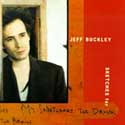 Even though it arrived just one year after his death, it seemed like forever passed before the world had a chance to hear the songs Buckley recorded at the time of his drowning in 1997. Sketches: For My Sweetheart The Drunk was packaged as a double-disc, one side consisting of the tracks Buckley recorded with Tom Verlaine and eventually mixed by Grace producer Andy Wallace, and the second side comprised of original mixes of two of the Sketches songs (which will likely sound no different to the casual listener) as well as several private four-track recordings. Disc One, the sophomore record Buckley never had a chance to finish, is a gem, but for hardcore fans, Disc Two is the real treasure—>even if the decision to release the artist's homemade demos is questionable at best. "I am a railroad track abandoned, with the sunset forgetting I ever happened," Buckley sings on the track "Once Opened." Sketches exists to make sure that never happens.
|

|
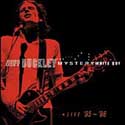 Rather than let the legacy rest, Columbia released Mystery White Boy in 2000, a collection of live Buckley recordings from the mid-90s. Most of the tracks ("Dream Brother," "Mojo Pin," "Last Goodbye") are culled from Grace, but the magic isn't nearly as pure. The quality of the recordings is acceptable but not exceptional. Considering the amount of time Buckley's mother Mary Gubert spent rummaging through live material, one would think the end result would reflect the beauty of his studio talents. Many of Buckley's live shows were intentionally anonymous (he used names like Father Demo, inspired by the concrete park at the intersection of Bleecker and 6th Avenue in New York), and they probably should have remained that way. But Buckley's most loyal followers will of course need to own this album for three Buckley originals unavailable anywhere else ("I Woke Up In A Strange Place," "What Will You Say," and "Moodswing Whiskey") and a stunning medley of the Buckley staple "Hallelujah" and Morrissey's "I Know It's Over."
|

|
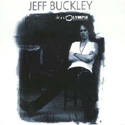 While Jeff Buckley only had one opportunity to bring his musical vision to fruition with 1994's Grace, he was renowned for being a consistently engaging live performer. And indeed, his posthumous live recordings (2000's Mystery White Boy and Live At l'Olympia) depict a musician who is restlessly—>some may say recklessly—>intent on delivering a truly unique experience night after night, eschewing the safe route in favor of stretching his band, his material, and of course his voice to their outermost limits. This disc, culled from soundboard cassette recordings from his two-night stand at the illustrious Parisian theatre in July of 95, finds Buckley and his band in an exultant mood, reveling in the enthusiastic reception of the crowd as well as in their own talents, indulging in the odd bit of levity (check the irreverent renditions of Led Zeppelin's "Kashmir" and the MC5's "Kick Out The Jams") but reining themselves in to deliver truly gorgeous versions of Grace favorites such as "Eternal Life" and "Hallelujah." Tellingly, it is said that Buckley himself thought these shows to be a true career highlight at the time.
|

|
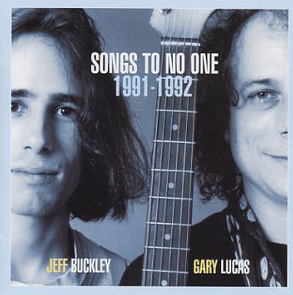 Songs To No One is by no means Buckley at his best. In fact, like the second disc of Sketches, it's unlikely he would even want these recordings to be heard. The sound quality is poor despite the fact that many of the live recordings were taped straight from the soundboard. But also like Sketches, the album is an interesting companion piece—>not to mention a missing link—>to the essential pieces of Buckley's catalog, namely Live At Sin-é, Grace, and Sketches. All of the tracks are "duets" with guitarist Gary Lucas, who met Buckley in 1991 and collaborated with the singer until his death. Highlights include a cover of Pat Kelly's "How Long Will It Take," recorded at CBGB's, an early version of "Mojo Pin," recorded at the Knitting Factory, as well as previously unreleased originals like the title track, "Cruel," and "Harem Man." Also included are solo and full-band demos of the song "Grace." Oddly, Gubert and producer Hal Willner chose to add additional instrumentation to two tracks, "Satisfied Mind" and "She Is Free."
|

|
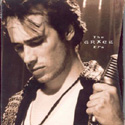 Just in time for Christmas 2002, Sony assembled Buckley's premier box set (and presumably not his last), a limited edition collection of promo and commercial singles and EPs. There's a wealth of material here, so let's cut right to the chase: The promo-only Peyote Radio Theatre includes the Na Champa Mix of "Dream Brother" and a version of Alex Chilton's "Kanga-Roo," both of which are now available on the Legacy edition of Grace, while the promo-only So Real (a.k.a. Live at Nighttown) features three live tracks exclusive to this collection: "So Real," "Grace," and "Dream Brother." The Live From the Bataclan EP was released in October 1995 and features four exclusive live recordings, including covers of Leonard Cohen's "Hallelujah," Van Morrison's "The Way Young Lovers Do," and "Je N'En Connais Pas la Fin" (made popular by Edith Piaf), alternate versions of which can be found on the expanded edition of Live At Sin-é. (This rendition of the Piaf song is notable for earning crazed applause from Buckley's French audience—>it's also part of a medley that includes "Hymne a l'Amour," a lengthy studio version of which was included on Songs To No One.) While these discs are for Buckley completists only, The Grace E.P. and Last Goodbye, the commercial single for Buckley's only U.S. chart hit, are essential for the standard, run-of-the-mill hardcore fan. The former includes the instrumental "Tongue," a Grace outtake recorded on a used cassette tape, while the latter, which includes a repeat of "Kanga-Roo" and a live version of Hank Williams's "Lost Highway" (also available on the Legacy edition of Grace), features a haunting, 13-minute performance of "Mojo Pin" coined "Chocolate Version," recorded live at the sadly now-defunct Wetlands in NYC. This track in and of itself is a testament to Buckley's awe-inspiring versatility and breadth of talent, and while it's not reason enough to shell out $35 (more casual fans might just want to pick up the standalone Last Goodbye import if they can find it), we should all envy those who were there that night.
|

|
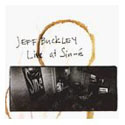 Reissued by Legacy Recordings with an additional 17 tracks, Live At Sin-é, originally released in November 1993, is what Mystery White Boy, Songs To No One, and the second disc of Sketches, for that matter, should have been: a private yet very public glimpse into the evolution of one of the most promising artists of the 90s. The album, which is hands down the most comprehensive and intimate collection of live Buckley recordings to date, captures the folk movement of the East Village that was still flourishing in the early part of the decade—>it's an artifact left over from when there were more artists on St. Mark's than fast food joints. The performances found here—>recorded at the Sin-é Café in the summer of 1993—>find Buckley disarmed, challenged, inspired and, above all, graceful. The album's liner notes read: "He was the Montgomery Clift of singer/songwriters, beautiful and bruised, struggling so hard to communicate you could feel it." One might call communication you can feel "music." And Live At Sin-é is beautiful communication indeed.
By Sal Cinquemani & Barry Walsh © slant magazine, 2004.

|
|

